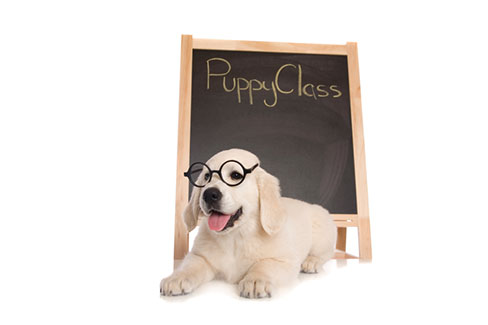
Did you know studies have shown that dogs will never be able to properly bond with humans if they aren’t exposed to them by 14 weeks of age? It’s hard to believe, but the first 4 months of your puppy’s life are vital in teaching them how to respond to the world around them. The process of gradually introducing your new puppy to all of the things that it will need to interact with as an adult is called Socialization. Socializing puppies to the world in a positive manner drastically decreases the risk of them developing fear and aggression issues later in life.
Ages 0-3 Weeks
Dogs go through 3 main socialization periods. The primary socialization period is, unfortunately, not something that most owners have control over. This is defined as the first 3 weeks of a dog’s life, where the most important interaction that they have with the world is through touch. Gentle handling during the first few weeks of life leads to calmer puppies that are more resilient to stress as adults. Puppies that are raised without littermates, or who are raised in kennels or barns with little human contact are more likely to have anxiety issues as adults. When purchasing a puppy from a breeder, be sure to ask them about their socialization tactics. A good breeder will be happy to tell you.
Ages 3-14 Weeks
The stage of socialization that most owners have control over happens from 3-14 weeks of age. This is the stage where puppies learn to play, but it is also when they begin to experience fear. Puppies at this age are often afraid of humans, loud noises, unfamiliar objects or animals, and unfamiliar environments. The more positive experiences that puppies have with these outside stimuli the less fearful they become. Thus, it is extremely important at this stage of a puppy’s life to introduce them to humans, children, cats, the car, the crate, etc.
Ages 14 weeks – 1 Year
The third stage of socialization occurs from 14 weeks until adulthood. During this stage puppies continue to gain awareness of their environment and learn what to fear and what not to. It is important to continue socializing puppies during this phase, but evidence suggests that the second stage of socialization is the most important indicator of their adult behavior.
Recommendations for Puppy Socialization
- Puppy Socialization Classes– Classes with puppies of the same age and vaccine status in a controlled and clean environment.
- NO DOG PARKS– Puppies less than 16 weeks old are still very susceptible to diseases that can be carried by older dogs. Dog parks are also often poorly controlled environments where your puppy is more likely to have a fearful experience with an older or larger dog.
- Desensitization– Play with feet and ears and look in your puppy’s mouth. Start practicing activities like nail trimming, brushing teeth, and ear cleaning at a young age so that they don’t become a struggle later. Puppies that are fearful of the veterinary clinic should visit regularly for practice. At West End Veterinary Clinic we are happy for you to stop by free of charge to practice getting on the scale, sitting on the exam table, and getting lots and lots of peanut butter from Dr. Mason.
- If you think that your puppy is abnormally timid or fearful, contact a trainer like Honest to Dog to evaluate them. It is always better to understand and eliminate behavior problems in younger dogs. Speaking with a trainer doesn’t make your dog a “bad dog”, it makes you a good owner.